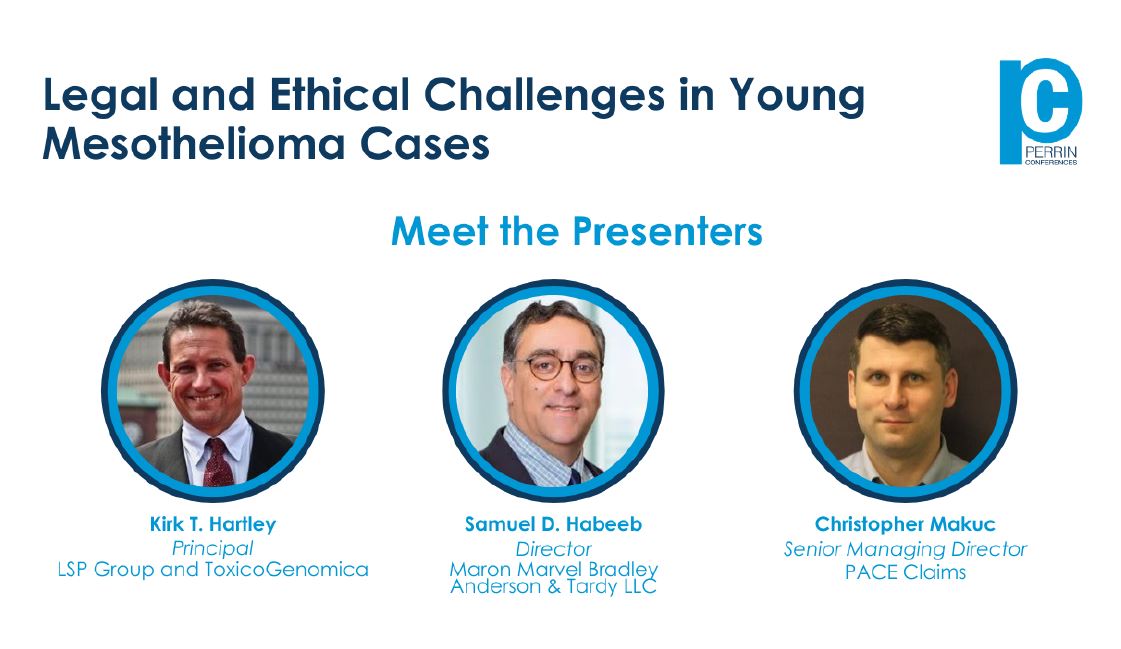DOWNLOAD PRESENTATION SLIDES
We are pleased to offer our readers a complimentary copy of the presentation slides. Complete the form below to download your copy.

It is unusual when a younger person (e.g. under age 50) develops a cancer or other disease or condition that might take their life. In some instances, those situations result in lawsuits involving claims that the cancer or other disease was caused by exposure to a “toxin.” Some of the many issues that may arise in cases of that sort were aired in a recent Perrin Conferences webinar: Legal and Ethical Challenges in Young Mesothelioma Cases.
The webinar featured three speakers who
addressed a range of topics, including genomic causation of cancers. The
opening section consisted of data and discussion by Kip Makuc of Pace Claims Services. Mr. Makuc presented a unique and thought-provoking distillation
of key numbers derived from just under 20 years of data on mesothelioma cases
involving persons under 50.
Going behind the statistics, Sam Habeeb of Maron Marvel provided examples of some of the many unique fact patterns presented by some of the cases involving persons under 50. Mr. Habeeb also provided insights and comments on legal and ethical challenges that have arisen in some of the cases, as well as example of other fact patterns and legal issues he expects to see presented in future cases. He pointed out that a frequent issue will be whether a mesothelioma was caused by genomic factors or exposure to asbestos..
Our Kirk Hartley presented facts from scientific papers (and some caselaw) to assist litigation stakeholders in anticipating and addressing genomic causation issues. Of particular note, a slide presented data from a 2019 study of the frequency of germline (inherited) mutations in solid tumors. The researchers found that germline mutations were most frequently found in the genomes of persons with mesotheliomas, as compared to other solid tumors (58% of the persons with mesotheliomas). Another slide presented data from a 2018 study that found the genomes of persons with mesotheliomas frequently included germline mutations in BRCA and other genes that are not BAP1.
Other slides presented data from a first of its kind retrospective study of 164 women with peritoneal mesothelioma who were treated at a premier cancer hospital (MD Anderson) from approximately 1976 – 2016. By looking back at old medical records and interviewing doctors, the researchers found the presence of genetically significant facts, including finding notable numbers of women who developed both peritoneal mesothelioma and a different cancer. The presence of multiple cancers in one person is a factor that experts in genetic diseases have established as a criteria for investigation for the presence of inherited cancer syndromes.
The MD Anderson researchers also found notable familial cancer histories involving cancers recognized to be part of cancer syndromes. One of the slides highlighted the family cancer histories involving peritoneal mesotheliomas, breast cancers, and colon cancers. “In total, 31% and 69% of patients had either a personal or family history of other tumors; most of these tumors are currently recognized as part of a syndrome.”
We are pleased to offer our readers a complimentary copy of the presentation slides. Complete the form below to download your copy. In addition, the Zoom webinar was recorded; the full a/v recording is available for purchase at this page of the Perrin Conferences web site.
We are pleased to offer our readers a complimentary copy of the presentation slides. Complete the form below to download your copy.